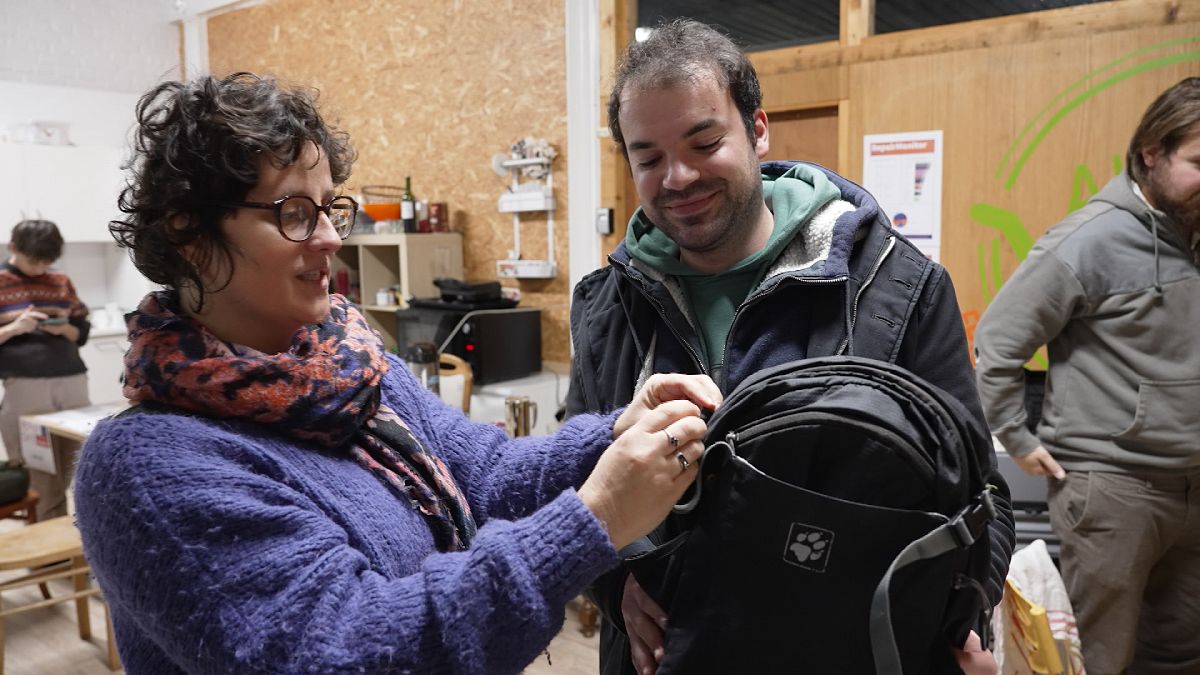How is Europe tackling its throwaway culture?

In this episode of The Road to Green, our reporter Cyril Fourneris travels to Amsterdam and Luxembourg to speak to the entrepreneurs and researchers on the frontline of Europe’s fight against e-waste.
Europeans consume a lot. We buy many electronic devices, and when they break we often tend to replace them. However, consumers complain that the smartphones and devices that we buy are not made to last, leaving them with no alternative but to replace them.
But buying new goods instead of repairing them costs billions of euros every year. So how can we manufacture and consume differently, so that sustainable, repairable and recyclable products become the norm?
Right to repair: ‘There are not enough resources in the world for us to keep this behaviour up’
Amsterdam is a second-hand paradise. The Dutch city is also where the Repair café concept was created.
There are now thousands of Repair cafés around the world. The principle is simple: fixing electronic devices to prevent consumers from having to spend more and throwing away repairable goods – thereby creating e-waste.
Former journalist Martine Postma created this concept in Amsterdam in 2009. “For me, it was a tryout, I wanted to check if something like this could work. And it did,” she told Euronews.
“We’ve become accustomed to the fact that things are cheap and that getting a new one is in many cases cheaper than going to a professional repairer. We need to turn that around. Because there are not enough resources in the world for us to keep this behaviour up.”
As part of a campaign to combat throw-away culture, a set of rules is about to come into force in Europe aiming to make repairs easier and cheaper, even after the warranty has expired.
In March 2023, the European Commission adopted a new proposal on common rules promoting the repair of goods known as the Right to Repair.
The EU says this will result in savings for consumers and support the objectives of the European Green Deal by reducing waste, among others.
The proposal will ensure that more products are repaired within the legal guarantee and that consumers have easier and cheaper options to repair products when the legal guarantee has expired or when the good is no longer functional due to wear and tear.
To move in this direction, the European Union has another major project: the Ecodesign for Sustainable Products Regulation (ESPR). The proposal consists of harmonising the requirements to make products sold in the EU easier to repair, recycle or reuse.
It establishes a framework to set ecodesign requirements for specific product groups to significantly improve their circularity, energy performance and other environmental sustainability aspects.
Professor of Industrial Design Engineering at TU Delft, Bas Flipsen, studies our everyday devices. He showed us around his laboratory.
“We assess the ease of disassembly, and then we assess also on recyclability,” he explained.
The lab also studies obsolescence and consumer attitudes.
“What will fail in an electric toothbrush is the battery, for instance. So you have to unglue it, and you have to take it apart. But there are also other things: the plastics will degrade, the rubber will degrade. But also the plastic parts will fade out,” Bas Flipsen revealed.
“People throw it in the bin. And that’s understandable. But you can also change this by making the battery more accessible or keeping it aesthetically appealing for a longer time.”
These tweaks would mean potential extra costs for the producer, but savings for consumers. That’s where a few rules have to make a difference.
“We have to change the way we design things, but also the way we sell them. And with the Right to Repair, but also with the new rules and regulations that will come out in 2024, I think it’s a big step towards a more sustainable future,” Bas Flipsen added.
Fairphone: ‘We’re in the business of changing the industry’
But can an electronic device really be more sustainable? Back in Amsterdam, we visited a start-up that is taking up the challenge.
Miquel Ballester is the Head of Product Management at Fairphone. The Dutch electronics manufacturer aims to minimise the ethical and environmental impact of its devices by using recycled and fair trade materials.
The latest Fairphone 5 can be taken apart with a simple screwdriver, and the flat design makes it easy to change parts instead of throwing the phone away. But Miquel insists what he’s doing isn’t revolutionary.
“The principle of durability, I would say, is the oldest engineering principle. You build things to last,” he told Euronews.
“Anything that has a printed circuit board costs a lot of energy to make. So once you’ve made it, you have to make sure that it’s in use as long as possible. And that’s difficult, with partners all over the world that still think a bit too linear. But that’s our business I would say, we’re in the business of changing the industry. And we do business because business is a powerful tool to shape the economy and also to influence the demand. To convince consumers about what is possible and what should be out there.”
Luxembourg’s product passport project: Sharing data, ensuring transparency
‘Empowering consumers’ is the aim of another new European directive called the Product Circularity Data Sheet or PCDS which is set to provide more information on the sustainability of products and combat greenwashing.
So how can we be better informed about what we buy? To find out, we head to Luxembourg – a country that has launched its product passport project.
“Luxembourg is striving to put in place a methodology to facilitate the transmission of information on the circular properties of products throughout the value chain so that it is available with the products when they are put on the market,” explained Jérôme Petry, the Project Manager at the Ministry of the Economy of Luxembourg.
While the digital data will track materials, they can come from far and wide. This is why a new ISO standard is set to guarantee transparency throughout the chain, right up to the shops.
“We’re going to have information on the composition [of a device], whether it contains any hazardous materials, whether there are any spare parts, what the recycled content is, and so on,” Jérôme Petry said. “We also need to make sure that this information lasts over time because afterwards, we’ll want to repair it, recondition it or whatever, but that could happen five or ten years later.”
The project echoes one of the major ambitions of the European ESPR regulation: the ‘digital product passport’, which should become the norm in Europe.
The data from the Luxembourg initiative could be fed directly into this passport, the cornerstone of the future common market.
“If we have 27 different regulations, if we have 27 different applications, it’s very difficult to have circularity within the internal market,” said Lex Delles, the Minister of the Economy for SMEs and Energy of Luxembourg.
“That’s why the ESPR is so important: to facilitate exchanges between the different companies working on circularity issues across Europe.”
Source: Euro News














